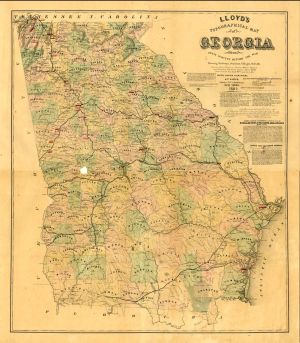 Today the Georgia Baptist Convention convenes at Second Baptist Church, Atlanta. Despite this being a religious gathering, there is no more discussed subject than that of the war. Atlanta, after all, is the target of Union General William Tecumseh Sherman‘s upcoming spring campaign. The attempted invasion of Atlanta, originating from federal-controlled Chattanooga, is expected to begin any day now.
Today the Georgia Baptist Convention convenes at Second Baptist Church, Atlanta. Despite this being a religious gathering, there is no more discussed subject than that of the war. Atlanta, after all, is the target of Union General William Tecumseh Sherman‘s upcoming spring campaign. The attempted invasion of Atlanta, originating from federal-controlled Chattanooga, is expected to begin any day now.
The meeting begins with worship at the traditional 11 AM time. Dr. Patrick H. Mell, a leading Calvinist, appropriately preaches from Acts 21:14, his sermon entitled “The will of the Lord be done.” It is not unfair to say that no one, nationalistic rhetoric aside, knows for certain what God’s will is in the face of the failing fortunes of the Confederacy.
Following lunch, delegates elect officers for the meeting. Mell is elected moderator; the rabidly pro-slavery Ebenezer W. Warren, pastor of the First Baptist Church of Macon, is elected clerk; and C. M. Irwin is elected assistant clerk.
Auxiliary bodies are recognized, reporters are invited to take their seats, committees are appointed. The Executive Committee report is then read, a statement that notes the “sad results” of the war and encourages delegates to support army mission efforts. Afterwards, representatives of mission boards and publishing houses, as well as visitors from Alabama and elsewhere, are recognized and seated.
With these formalities finished, delegates for the remainder of the day turn their attention to war related matters, the first being that of the orphans of soldiers. The following resolution is thus passed:
Resolved, That the Moderator appoint a committee of seven to take into consideration the propriety and practicability of establishing within the bounds of this Convention an orphan house or asylum for the education and support of destitute and helpless orphan children residing in the State of Georgia; said asylum to be under the patronage and direction of the Georgia Baptist Convention.
Resolved, That the committee be requested to report as soon during this session as possible, and, if a favorable report be made, that the committee be also requested to suggest a plan of operation.
After the orphan house resolution, delegates address the war from several different angles:
A letter was read from a Baptist soldier, addressed to the Moderator, urging him to solicit Baptist ministers to go to Gen. Johnston’s army and preach to the soldiers.
Bro. Robert, missionary to the army of Northern Georgia, read a statistical account of the number of ministers of all denominations now engaged in the work in that army, as follows: Baptists, 23; Methodists, 41 ; Presbyterians, 10; Episcopalians, 1 ; Catholics, 1.
Bro. Given, missionary in the army, accepted a seat in the Convention.
The Committee on Preaching made the following report: To-night, in Second Baptist Church, a meeting of the Georgia B. B. and Colp’r Society and the Virginia Bap. Colp’r and S. S. Publication
Society:W. C. Wilkes to preach at First Baptist Church. Prayer meeting tomorrow morning, at eight o’clock; Domestic Board to-morrow night. .
A letter was read from General Gordon, addressed to this body, through Bro. Brantly. It contained a statement of how little we have done, and how much we ought to do for the religious welfare of our army.
Brethren Brantly, Vason and Given were appointed a committee on Gen. Gordon’s letter and similar documents.
Bro. Campbell moved the hours of meeting and adjournment be as follows: Meet at 9 A. M and 3 P. M.; adjourn at 12 1/2 and & 5 P. M.
Colonel Edwards, of the 47th Regiment, made an interesting address on the religious wants of the army.
Brother Sumner stated thot the Domestic Board were ready to support any ministers who were willing to go to the army.
On motion of Bro. Campbell, the Convention adjourned till to-morrow.
While Southern Baptists of Georgia may be second to none in regards to Christian nationalism, many in the United States also invoke God’s favor in the war. Today the Coinage Act of 1864 is passed, an act that authorizes the printing of a two-cent coin that is to bear the motto, “In God We Trust.” The motto, originally suggested by a Baptist minister, is not supported by all Baptists of the North. For decades following, the phrase is sporadically used on some U.S. coins.
Sources: Minutes of the forty-second anniversary of the Georgia Baptist State Convention, held at Atlanta, the 22nd, 23rd and 25th of April, 1864 (link); “History of ‘In God We Trust,'” U.S. Department of the Treasury (link)


